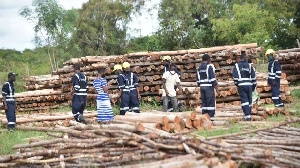 Workers at Komaza Forestry in Kilifi County, at Kenya's Coast, KEVIN ODIT | NMG
Workers at Komaza Forestry in Kilifi County, at Kenya's Coast, KEVIN ODIT | NMG
Kenyan firm Komaza is using technology to guide thousands of farmers in coastal and central regions on planting and tending to trees in order to benefit from the booming timber market.
The company's “micro-forestry” model is a shift from large, costly plantations to distributed partnerships with local farmers. The shift provides an 80 percent cost savings over traditional plantations, for every acre planted, while unlocking more land for forestry activities.
Komaza plans to add a new direct-to-farmer mobile app to drive enrolment and increase access to best practises for farmers. The firm will also build on the success of a recent remote sensing and artificial intelligence pilot project for automated monitoring of farms. The company offers a forestry model that aligns the interests of local communities with global objectives to combat climate change.
With more than 400 field workers using mobile apps to track the progress of each tree planted by over 5,000 farmers in the past five years, Komaza is combining high-scale operations with digital intelligence to ensure trees are grown in accordance with the required standards to meet increasing demand of timber in Kenya and the region. Komaza is currently planting commercial-grade forests in Kilifi and Central Kenya with a target of planting over one million trees by more than 5,000 new farmers every year. It also targets to plant one billion trees by 2030 and unlocking investments worth $400 million.
The firm’s model involves farmers dedicating one acre of their farms for the project with Komaza supplying the seedlings and other farm inputs such as sawmills at no cost.
Majority of the farmers in Kenya's Coast and Central regions engage in subsistence fruit and vegetable farming. Komaza will intensify partnerships with these smallholder farmers to help them adopt inter-cropping. They will provide the farmers with training, planting inputs, maintenance support, harvesting services, and a guaranteed market for trees and wood products.
“I harvested my first trees and used the money to pay school fees for my children and bought a dairy cow. I intercrop the trees with cassava,” said Grace Lugho, a mother of nine in Kilifi County.
George Mwalandi, another beneficiary said Komaza assures them of a ready market for their trees and proceeds from their timber is deposited into their accounts on time.
“Komaza gives 256 seedlings to each farmer to plant on one acre. The new species of eucalyptus trees mature within a short period and do not interfere with other crops such as cassava,” said Mr Mwalandi.
To ensure the project’s sustainability, Komaza raised $28 million from different partners with the United States Agency for International Development as the major contributor. USAid’s objective is to have one billion trees planted in the next decade. USAid’s support makes Komaza Kenya's largest industrial tree planter.
Komaza founder and CEO Tevis Howard said the company in partnership with 25,000 farmers has seen over six million trees planted in Kenya.